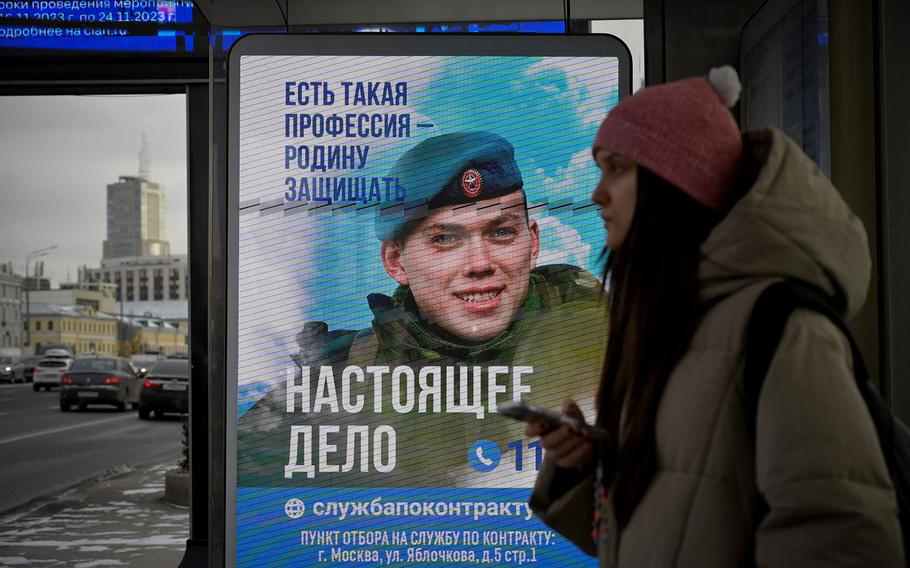
A woman waits at a bus stop with an advertising screen promoting contract military service in the Russian army and reading “There is such a profession to defend fatherland,” in Moscow on Nov. 22, 2023. (Natalia Kolesnikova, AFP via Getty Images/TNS)
Russia has sent so many men to join its war in Ukraine that crime levels in the country fell soon after the invasion began. Now their return is starting to unleash a wave of offending.
Crimes committed by servicemen that aren’t linked to the war increased by more than 20% last year, according to data from Russia’s Supreme Court. While the overall numbers are still small and many returning service members don’t go onto commit offenses, there was a jump in cases of violent crimes as well as thefts and drug-related transgressions.
The figures exclude crimes involving tens of thousands of convicts released from jail to join the war under a program set up by the late Wagner mercenary group leader Yevgeny Prigozhin. Those who survived six months at the front were able to gain a pardon from President Vladimir Putin and return to Russia as free men.
In prison, “they are treated like ‘we are nothing,’ then it all gets even worse at the front,” said Kazan-based sociologist Iskender Yasaveev. “The experience they return with is a trauma that will manifest itself for decades.”
Sociologists have long noted that crime levels often surge following the end of military conflicts, and researchers have looked at many possible causes for this from social disruption to trauma faced by soldiers. Russia is unlikely to buck that trend after Putin ordered the February 2022 invasion that triggered Europe’s largest conflict since World War II. The return of prisoners who fought for Wagner is offering an early signal of what may lie in store once hundreds of thousands of men brutalized by the fighting return to civilian life.
While lower-level crimes fell, the number of murders and sex offenses, particularly against children, hasn’t declined in the past two years. Indecent assault against minors surged by 62% compared to the prewar period, according to Bloomberg calculations based on Supreme Court data.
The return of Wagner recruits to Russia has proved a shock to residents of cities and villages who discover men they thought were serving long jail terms living among them. People convicted of murder, and even cannibalism, have been among those pardoned.
Before his death in a plane crash after he led an abortive mutiny against the Defense Ministry’s leadership in June last year, Prigozhin claimed 32,000 convicts he’d recruited had returned to Russia from the war.
Kremlin spokesman Dmitry Peskov responded to widespread public disquiet by telling reporters in November that criminals pardoned by Putin “atone with their blood for their crime on the battlefield.”
Still, a law that took effect in March quietly removed the right to a pardon after six months of service, forcing criminals who join up to remain in the military until the end of the war, like others drafted into the army.
Nevertheless they return, often by deserting. Crimes involving the military increased fourfold to 4,409 in 2023 compared to 2021, the Supreme Court data show.
One deserter, Artyom, said he fled after half his squad of assault troops were killed during four months in Ukraine. The 34-year-old, who asked not to be identified by his family name, joined the army to escape harsh treatment in the prison colony where he was serving a sentence for drug trafficking. Nobody told him the service was indefinite, he said.
The law that ended pardons also allows the Defense Ministry to enlist not only convicts but also people held in pretrial detention. Russia Behind Bars, a prisoners’ rights group, estimates as many as 175,000 former prisoners in total were taken to fight on the battlefield.
A postwar surge in crime may cost Russia as much as 0.6% of its gross-domestic product, said Alex Isakov, Russia economist at Bloomberg Economics. Alongside the direct costs to life and property, the state will face higher spending on welfare and security, especially on police, he said.
Anxious to avoid a repeat of the September 2022 draft of 300,000 reservists that prompted a spike in public anxiety over the war, the Kremlin is relying instead on generous payments to persuade men to join the army. Contract soldiers are offered monthly payments of 204,000 rubles ($2,300) in addition to signing bonuses that can reach as much as 1 million rubles.
That’s helped contribute to a short-term decline in crime particularly in Russian provinces. The slide in recorded crimes was three times greater in areas with high recruitment into the army, compared with regions with only moderate levels, according to Bloomberg Economics estimates.
“Economic crimes such as theft and robbery, which are associated with poverty, have decreased because the war has poured money into the poorest regions and the poorest segments of the population,” says sociologist and crime researcher Ekaterina Khodzhaeva.
Russian courts dealt with almost 62,000 fewer cases last year than in 2021, and the number of convicts fell by 2%. Police numbers have also fallen in many regions, suggesting fewer were available to solve crimes, as people abandoned poorly paid jobs for more lucrative military service.
The Interior Minister Vladimir Kolokoltsev said in May there’s a shortfall of 152,000 officers across Russia, with one in four positions vacant in some regions.
That’s likely to add to the challenges facing the authorities in curbing crime as increasing numbers of convicts return from the war to civilian life.
“Like any other veteran, they are likely to have post-traumatic stress disorder,” said Anna Kuleshova, a sociologist at the Social Foresight Group. “That’s coupled with a previous experience of incarceration, all of which combine and can lead to difficulties with integrating into society.”
©2024 Bloomberg L.P.
Visit bloomberg.com.
Distributed by Tribune Content Agency, LLC.